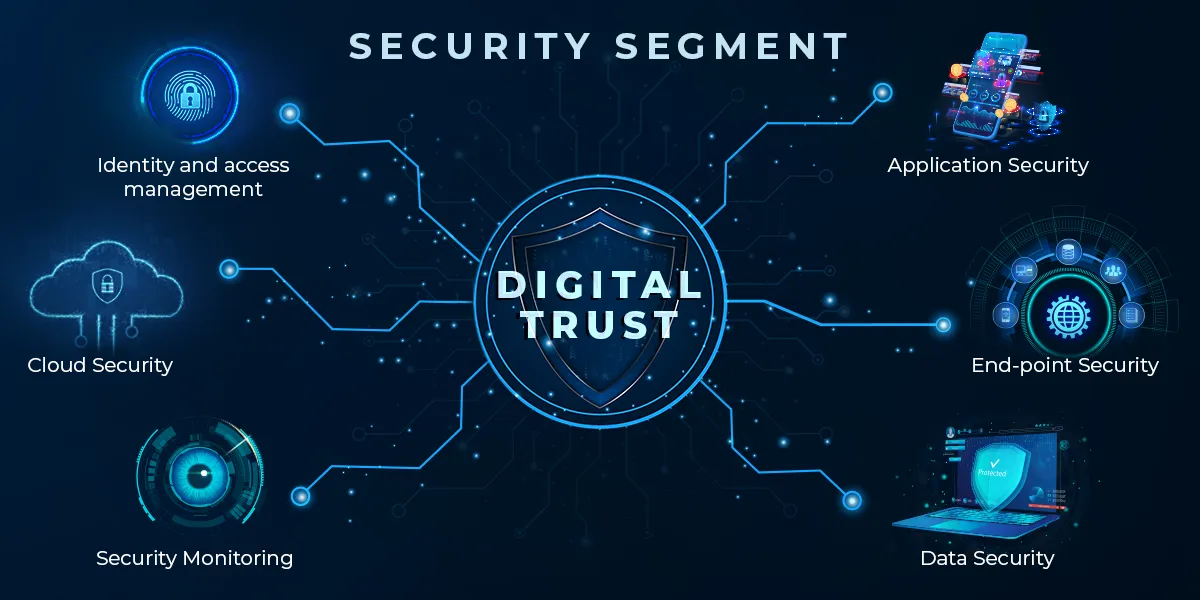Introduction: In our day and age, when technology is ingrained in every part of our lives, trust has whole new meaning. With our increased immersion in a world full of gadgets and software, digital trust is becoming more and more important. Securing our future is more important than only safeguarding our data.
Digital trust forms the cornerstone of a secure digital landscape. It encompasses the confidence individuals, businesses, and societies have in the reliability, integrity, and security of the technologies they interact with daily. From smartphones and smart homes to cloud services and IoT devices, the proliferation of digital technologies has exponentially increased our reliance on interconnected systems.
However, this interconnectedness comes with its own set of challenges. The rapid pace of technological advancement often outstrips our ability to ensure robust security measures. Vulnerabilities lurk in the most unexpected places, waiting to be exploited by malicious actors. From data breaches to cyber-attacks, the repercussions of compromised digital trust can be devastating, both on a personal and societal level.
Yet, amidst these challenges lies an opportunity – an opportunity to harness the power of digital trust to create a secure world brimming with possibilities. By fostering trust in the digital ecosystem, we can pave the way for innovation, collaboration, and progress. Here’s how:
Building Secure Foundations: Trust begins with security. To create a secure digital world, it’s essential to prioritize robust cybersecurity measures at every stage of development. From encryption protocols to multi-factor authentication, implementing strong security measures can fortify the foundations of digital trust.
Transparency and Accountability: Transparency breeds trust. Companies and developers must be transparent about their data practices, privacy policies, and security measures. By holding themselves accountable and being open about their processes, organizations can instill confidence in their users and stakeholders.
Education and Awareness: Empowering users with knowledge is key to building digital trust. Educating individuals about cybersecurity best practices, data privacy, and the importance of strong passwords can help mitigate risks and foster a culture of digital responsibility.
Collaborative Efforts: Digital trust is a collective endeavor. Collaboration between governments, businesses, academia, and civil society is crucial to addressing the complex challenges posed by cybersecurity threats. By sharing information, resources, and expertise, stakeholders can work together to strengthen the resilience of the digital ecosystem.
Innovation with Integrity: Innovation should not come at the cost of security. As we embrace emerging technologies such as AI, blockchain, and quantum computing, it’s imperative to embed security and privacy by design principles into the development process. By prioritizing integrity and ethics, we can ensure that innovation drives positive change while upholding digital trust.
Continuous Adaptation: The digital landscape is ever-evolving, and so too must our approach to cybersecurity. Organizations must remain vigilant, continuously monitoring for emerging threats and adapting their security strategies accordingly. By staying one step ahead of cybercriminals, we can safeguard digital trust in an increasingly dynamic environment.
In conclusion, digital trust is the linchpin that holds together our interconnected world of devices and software applications. By prioritizing security, transparency, education, collaboration, integrity, and adaptability, we can forge a future where digital trust flourishes, creating a secure and resilient digital ecosystem for generations to come. As we navigate the complexities of an increasingly digital world, let us remember that trust is not just a foundation – it’s the bedrock upon which our future depends.
Q1: What is digital trust?
A1: Digital trust refers to the confidence individuals, businesses, and societies have in the reliability, integrity, and security of the technologies they interact with daily.
Q2: Why is digital trust important?
A2: Digital trust is important because it forms the foundation of a secure digital landscape. It ensures that users can rely on the safety and integrity of the technologies they use, fostering confidence and enabling innovation.
Q3: How can digital trust be built?
A3: Digital trust can be built through measures such as prioritizing robust cybersecurity, transparency and accountability in data practices, educating users about cybersecurity best practices, fostering collaboration between stakeholders, embedding security into innovation processes, and continuously adapting to emerging threats.
Q4: What are the risks of compromised digital trust?
A4: The risks of compromised digital trust include data breaches, cyber-attacks, loss of privacy, financial losses, damage to reputation, and societal disruptions. These risks can have far-reaching consequences on individuals, businesses, and societies.
Q5: What role does education play in building digital trust?
A5: Education plays a crucial role in building digital trust by empowering users with knowledge about cybersecurity best practices, data privacy, and the importance of maintaining strong security measures. Educated users are better equipped to protect themselves and contribute to a culture of digital responsibility.


